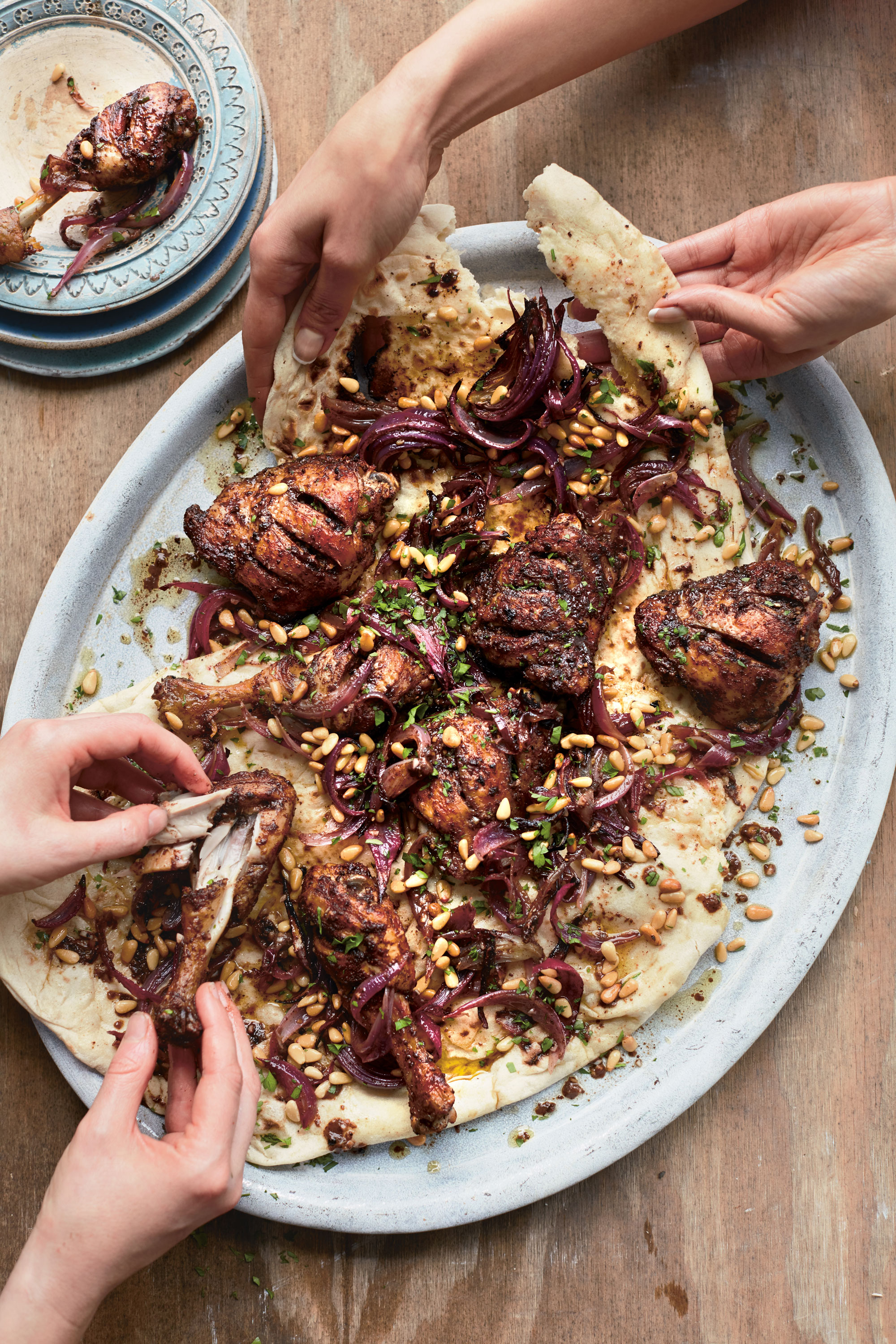Pamela Anderson and Palestinian food aren’t an obvious pairing—yet pictures of the model hang on the walls, and plates of warm flatbread appear from the kitchen at East London bar Pamela, where I am speaking with British-Iranian-Pakistani food writer Yasmin Khan.
“We’re talking about Palestine and surrounded by pictures of Pamela Anderson’s breasts!” laughs Khan. It’s a weird mix but somehow, it works. The Baywatch babe-honouring bar is currently hosting Palestinian pop-up What the Fattoush, and Khan suggested we meet here to try some of their vegan mezze dishes.
Videos by VICE
“Palestinian olive oil is so good,” she says, dipping a triangle of bread into the peppery pool of oil made from the zaitoun, or olive tree—which she sees as the bedrock of almost all Palestinian cuisine. It also gives Khan’s new cookbook its name: Zaitoun: Recipes and Stories from the Palestinian Kitchen, which was released earlier this month.
“Every house I visited, the family has olives in their garden or on their land,” Khan says. “I think the olive tree represents a lot to Palestinians—it’s a connection to the land, to their steadfastness. And when the trees are uprooted, it also represents their displacement.”
Collecting the food stories and favourite recipes of ordinary people in her travels through Palestine, Zaitoun sees Khan explore the vibrant flavours and rich traditions of Palestinian food culture, which is so integral to the identity of its troubled people. Despite focusing her first cookbook, The Saffron Tales: Recipes from the Persian Kitchen, on her Iranian heritage, Khan says that the follow-up “feels more me”—not least because of the personal connection she feels towards Palestine and its people through food.
When we talk about this connection, Khan refers to an Arabic phrase: “The bread and salt between us.” Commonly used in Arabic countries, it symbolises the bond built through sharing a meal.
“I always joke that it’s hard to hate with food on your plate,” she says, in between mouthfuls of creamy hummus.

Writing about food in a place as politically charged as Palestine wasn’t without its challenges (“I was like, ‘How do I write a cookbook about this?’ No one wants to get bummed out reading a salad recipe,” recalls Khan). It was part of her mission as a writer to celebrate Palestine’s culinary and cultural richness, while shedding light on the impact of the Israeli occupation. In Gaza, for example, 80 percent of the population relies on food aid to survive, and the water is largely undrinkable.
“Food is so powerful that way; so visceral and sensory,” Khan says. “This project in particular was everything: fun, frightening, joyful, stressful. But that’s the reality of what’s going on out there and I wanted to be true to what people of the region are experiencing, so I shared their stories.”
The recipes in Zaitoun are similarly diverse, featuring Palestinian staples like hummus, chicken with sumac, as well as vegetarian versions of classic meals, such as maqloubeh, an upside-down rice dish with a crispy shell that cracks to reveal smoky aubergines and fluffy spiced rice.
One of Khan’s favourites from the new book is musaka’a, a simple yet flavoursome plate of roasted aubergines, spiced chickpeas, and tomatoes drizzled in olive oil that gives a tangy, rich taste.
“It sounds dead simple but there’s something about the slow-cooking of the garlic and allspice—such a wonderful spice, I use it in all my cooking,” she says. “I remember eating it in Ramallah, under a bright, full moon with a group of people who teach yoga to women in refugee camps. It felt magical.”
Among the recipes, Zaitoun is peppered with memorable stories like this. In one section, Khan recalls a visit to the house of a Palestinian singer, with whom she made fattoush.
“She was incredible, in the middle of chopping peppers, she would go, ‘Oh, I’ve got to show you this dress that Yasser Arafat gave me!’ and she brought out this traditional Palestinian dress with red embroidery,” she remembers. “She sang for us and we all cried.”

Zaitoun is a celebration of more than just Palestinian food, it’s a chance to talk about its people and their resilience. Khan looks at the other diners in What the Fattoush, chatting over plates of crunchy falafel and fresh tabbouleh.
“These guys [the owners of What the Fattoush], what we’re both trying to do in our missions is to use food as a way of bringing people to the table and saying, ‘Let’s celebrate something about Palestine.’ It opens up a conversation.” (The pop-up donates 10 percent of its profits to SkatePal, an NGO that supports young people in Palestine by teaching skate skills).
With our mezze almost finished, Khan asks me if I cook. I shake my head with regret—I love to eat but sadly don’t know my way around a stove. But flicking through Zaitoun, I feel encouraged. These ingredients are sitting in my cupboard—Arabic flavours I know and now appreciate all the more, thanks to the culinary journey described in Khan’s writing.
With our bellies full of dough and spices, Khan and I say goodbye and go our separate ways. Me? I’m heading straight to my kitchen.
More
From VICE
-

Makai McNamara -

Pearl Jam, Nirvana, Soundgarden, and Alice in Chains. (Photos via Krasner / Trebitz / Redferns; Annamaria DiSanto / WireImage; Paul Bergen / Redferns; Gutchie Kojima / Shinko Music / Getty Images) -

Screenshot: Team17 -

Screenshot: Tony Hawk Pro Skater (Facebook)
